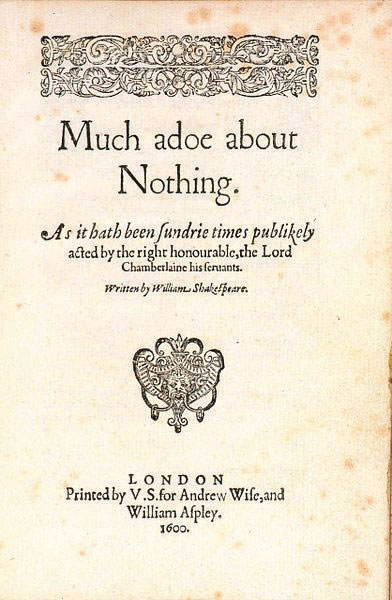This is “Much Ado About Nothing”, section 3.9 from the book British Literature Through History (v. 0.1). For details on it (including licensing), click here.
For more information on the source of this book, or why it is available for free, please see the project's home page. You can browse or download additional books there. To download a .zip file containing this book to use offline, simply click here.
3.9 Much Ado About Nothing
PLEASE NOTE: This book is currently in draft form; material is not final.
Learning Objectives
- Summarize themes found in Much Ado About Nothing and specific incidents in the plot which exemplify those themes.
- Identify major characters.
Generally considered one of Shakespeare’s greatest comedy plays, Much Ado About Nothing is ostensibly a play about two couples and the trials of their courtships: Benedick and Beatrice, Claudio and Hero. Within this witty and amusing portrayal of two troubled courtships, Shakespeare explores themes of deception, language, and loyalty and honor.
Theme of Deception
In the course of these courtships, the theme of deception figures prominently in both cases—in one case leading to clever repartee and an amusing “battle of the sexes,” in the other case leading to a serious accusation, broken trust, and, apparently, death.
As frequently occurs in Shakespeare’s plays, a song provides a statement of an important theme: deception.
Sidebar 3.4.
Sigh no more, ladies, sigh no more,
Men were deceivers ever,
One foot in sea and one on shore,
To one thing constant never:
Then sigh not so, but let them go,
And be you blithe and bonny,
Converting all your sounds of woe
Into Hey nonny, nonny
As the play progresses, the audience begins to think that both Beatrice and Hero would have been better off had they heeded the advice of the song and let go of Benedick and Claudio.
Elements of deception in the play include the following:
- the song
- the masquerade—Deception is, after all, the purpose of a masquerade, and many deceptions occur in this scene: Don Pedro courts Hero for Claudio; Benedick hints at his feelings for Beatrice while pretending to be someone else; Beatrice spurns Benedick while supposedly thinking him someone else; Claudio pretends to be Benedick when Don John attempts to deceive him; Claudio, as a result of Don John’s comments, believes Don Pedro has deceived him.
- “overheard” conversations for Benedick and Beatrice
- Don John’s deception (Borachio’s motivation=money; Don John’s=jealousy)
- Margaret’s deception
- Friar Francis’ deception (Hero is dead plan)

Theme of Language
The word play and witty repartee between Benedick and Beatrice is a highlight of the play. Yet, it is Dogberry, with his mangled language, who acts nobly and solves the problem. The noble characters, with their courtly, clever language, deceive. Dogberry uncovers the truth.
Theme of Loyalty and Honor
Both couples must deal with conflicts between loyalty and honor. Claudio obviously places his honor above his loyalty to his bride when he is convinced of her infidelity and makes a public spectacle of Hero at their wedding. Benedick is torn between loyalty to his friend Claudio and honoring Beatrice’s request to avenge Hero. The brothers, Don Pedro and Don John, seem to embody loyalty and honor and disloyalty and dishonor.
Characters
- Don Pedro—Prince of Aragon
- Don John—the bastard brother of Don Pedro and the main villain
- Benedick—a Lord of Padua; companion of Don Pedro
- Claudio—a Lord of Florence; companion of Don Pedro
- Balthasar—an attendant on Don Pedro
- Borachio and Conrade—followers of Don John
- Leonato—Governor of Messina
- Hero—Leonato’s daughter
- Beatrice—Leonato’s niece
- Antonio—brother of Leonato
- Margaret—gentlewoman attending Hero
- Ursula—gentlewoman attending Hero
- Friar Francis—a priest
- Dogberry—the constable of Messina’s night watch
- Verges—Dogberry’s partner
- A Sexton—the judge of the trial of Borachio
- The Watch—watchmen of Messina
Key Takeaways
- The plot of Much Ado About Nothing develops themes of deception, language, and loyalty and honor.
- The play ironically depicts noble characters who pride themselves on their wit and clever use of language falling into a web of deception while the clown Dogberry reveals truth.
Exercises
- Identify examples of Dogberry’s malapropisms, the often unintentional misuse of words, in place of similar sounding words, for humorous effect. For example, in Act III, Scene 5, Dogberry says to Leonato, “our watch, sir, have indeed comprehended two aspicious [auspicious] persons,” confusing apprehended with comprehended and suspicious with auspicious.
- In Act IV, scene 1, Claudio says, “O, what men dare do! what men may do! what men daily do, not knowing what they do!” Why is this statement ironic?
- Why did Margaret not confess her part in the deception of Claudio, thus avoiding the conflict between Claudio and Hero?
- In Act IV, scene 2, Dogberry asks, “Is our whole dissembly appeared?” Why is this malapropism particularly appropriate?
- How would you judge the effectiveness of Friar Francis’s plan?




